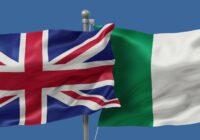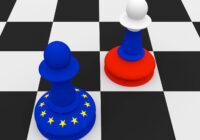How real is the French-German pact signed at Aachen this week? Can it save and even reinforce Europe?
What many assumed to be simply the routine renewal of the 1963 Elysée Treaty between France and Germany has turned into a possible pivotal moment in the history of modern Europe. As Brexit continues on its chaotic and increasingly irreparable course, Paris and Berlin have just committed on paper to radically stronger forms of cooperation and collaboration.
The potential implications of the treaty have permitted two contested leaders, Emmanuel Macron and Angela Merkel, to stand proud and appear in control, at least temporarily. This immediately provoked cries of outrage and lèse-majesté from the nationalists on the right and the left.
Evoking the terms of the new agreement and the reaction of critics, The Guardian provides this headline: “France and Germany provoke populist anger over ‘friendship pact.’
Here is today’s 3D definition:
Pact:
An agreement whose informality allows itself to be perceived as either an act of devious complicity or a creative endeavor, depending on the critic’s point of view
Contextual note
What was initially a commitment to a loose friendship, symbolically ending nearly two centuries of intermittent enmity, appears to be morphing into what may turn out to be the first virtual merger of two powerful nation-states. Its multiple implications tell us a lot about current geopolitical trends.
The Economist sees the treaty not only as a sign of the weakness of both leaders, but as a source of future conflict within the European Union. But the same Economist, in a 2017 report on the EU declared that the “European Union is in poor shape. It needs more flexibility to rejuvenate itself.” The new treaty could be seen as an attempt to gain flexibility and especially to marginalize the trend toward nationalist populism that has achieved power in several Eastern European countries, threatens every nation in Western Europe and has guided the United Kingdom into the horror show of Brexit.
Despite its current travails, Europe has achieved a remarkable degree of coherence in the aftermath of centuries of internal warfare. But it has failed to reach the level of unity that an effective and stable regional organization requires for survival and growth. The economic and military cooperation foreseen in the Franco-German treaty, along with the intention to closely align foreign policy and give Germany a voice at the UN Security Council, point toward an ambition of establishing definitive leadership for the tandem within the union itself. They formulate it as a near merger thanks to a “convergence” not just of interests, but of policy and culture.
This raises the question, reflected in The Economist’s observations, of whether the imbalance created by the convergence may not shatter the 27-nation union that remains after the theoretical exit of Britain, or whether the gravitational force of a German-French tandem within Europe will make it possible for the EU to acquire the clout it has hitherto lacked for playing the role of a major world power in an increasingly multipolar world.
Historical note
A European creation dating back to the 16th century, the nation-state has become the political model for the entire globe. The confusion and chaos brought on by Martin Luther’s quickly splintering Reformation, which divided the populations of the different kingdoms and principalities even more decisively than Brexit has, sought a simple solution with the Peace of Augsburg. This was by formulating the principle “Cuius regio, eius religio,” meaning the head of state was entitled to select the Catholic or Lutheran religion for his people.
 This “compromise” set off a century of religious conflict that was finally settled by the Treaty of Westphalia in 1648, effectively establishing the nation-state — rather than a diversity of principalities — as the unique model to be emulated to achieve a viable political organization. It took more than two centuries after Westphalia to settle the entire European continent into the nation-state model, with the unification of Italy and Germany in the latter half of the 19th century. Eastern Europe and the Balkans, in particular, continually struggled to adapt, as attested by the history of Poland, which as a political entity was erased from the map of Europe in 1795, only to re-emerge 123 years later.
This “compromise” set off a century of religious conflict that was finally settled by the Treaty of Westphalia in 1648, effectively establishing the nation-state — rather than a diversity of principalities — as the unique model to be emulated to achieve a viable political organization. It took more than two centuries after Westphalia to settle the entire European continent into the nation-state model, with the unification of Italy and Germany in the latter half of the 19th century. Eastern Europe and the Balkans, in particular, continually struggled to adapt, as attested by the history of Poland, which as a political entity was erased from the map of Europe in 1795, only to re-emerge 123 years later.
The European ideology that imposed the model of nation-state typically provoked ambitions of empire building through colonial conquest. But it also led to continual conflict between the nation-states themselves, culminating in the 20th century with two world wars. The creation of the European Common Market and subsequently the European Union suggested a new model that strove to go beyond the idea and ideology of nation-states, while still respecting their preeminence.
The idea of regional organizations suggested by the relative success of Europe has since emerged as a possible model for a more rational approach to international relations, as it is designed to attenuate the strongly competitive nature of the nation-state model. But, as we have seen with the Arab League, it has failed to materialize in any meaningful way outside of Europe, and in Europe itself it is increasingly called into question.
For Macron and Merkel, the idea of a virtual merger of powers within a regional framework may appear to be the way to counter the centrifugal force represented by nationalist movements in each nation-state that balk at the idea of international cooperation.
Whether this can work only the future will tell, but the idea of two complementary powers — speaking two different languages — having to agree among themselves to solve regional and global problems opens some interesting perspectives. Especially in the context of a rapidly declining American empire and the rise of China.
*[In the age of Oscar Wilde and Mark Twain, another American wit, the journalist Ambrose Bierce, produced a series of satirical definitions of commonly used terms, throwing light on their hidden meanings in real discourse. Bierce eventually collected and published them as a book, The Devil’s Dictionary, in 1911. We have shamelessly appropriated his title in the interest of continuing his wholesome pedagogical effort to enlighten generations of readers of the news.]
The views expressed in this article are the author’s own and do not necessarily reflect Fair Observer’s editorial policy.
Support Fair Observer
We rely on your support for our independence, diversity and quality.
For more than 10 years, Fair Observer has been free, fair and independent. No billionaire owns us, no advertisers control us. We are a reader-supported nonprofit. Unlike many other publications, we keep our content free for readers regardless of where they live or whether they can afford to pay. We have no paywalls and no ads.
In the post-truth era of fake news, echo chambers and filter bubbles, we publish a plurality of perspectives from around the world. Anyone can publish with us, but everyone goes through a rigorous editorial process. So, you get fact-checked, well-reasoned content instead of noise.
We publish 2,500+ voices from 90+ countries. We also conduct education and training programs
on subjects ranging from digital media and journalism to writing and critical thinking. This
doesn’t come cheap. Servers, editors, trainers and web developers cost
money.
Please consider supporting us on a regular basis as a recurring donor or a
sustaining member.
Will you support FO’s journalism?
We rely on your support for our independence, diversity and quality.






